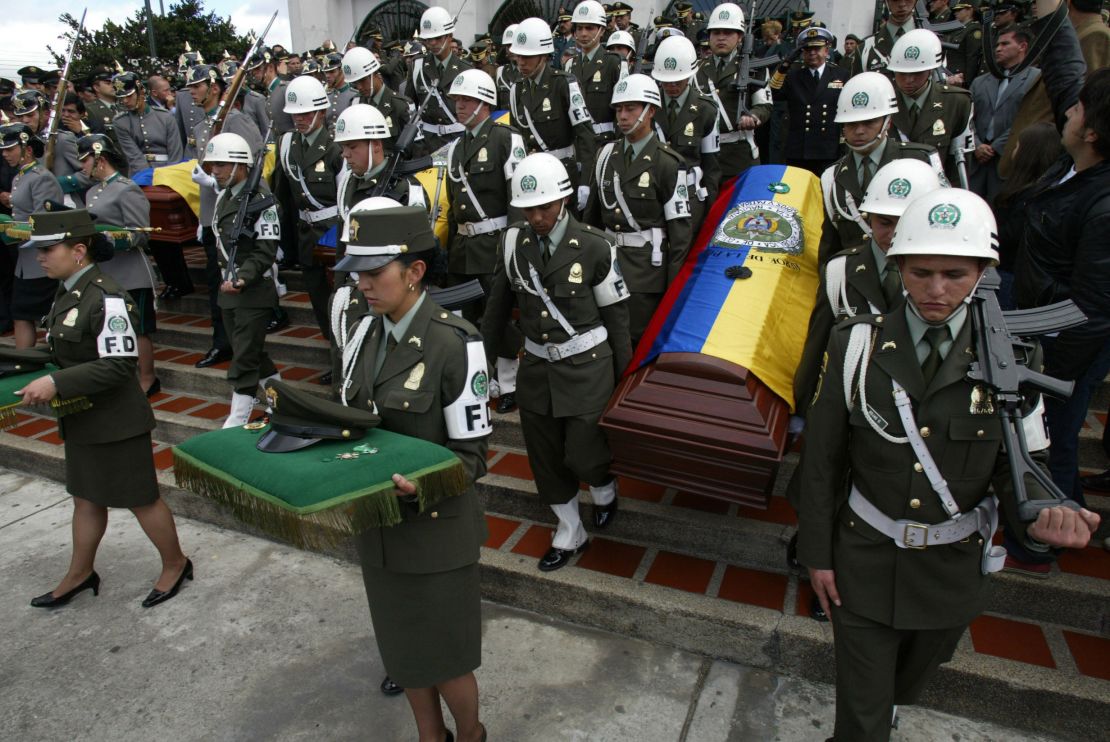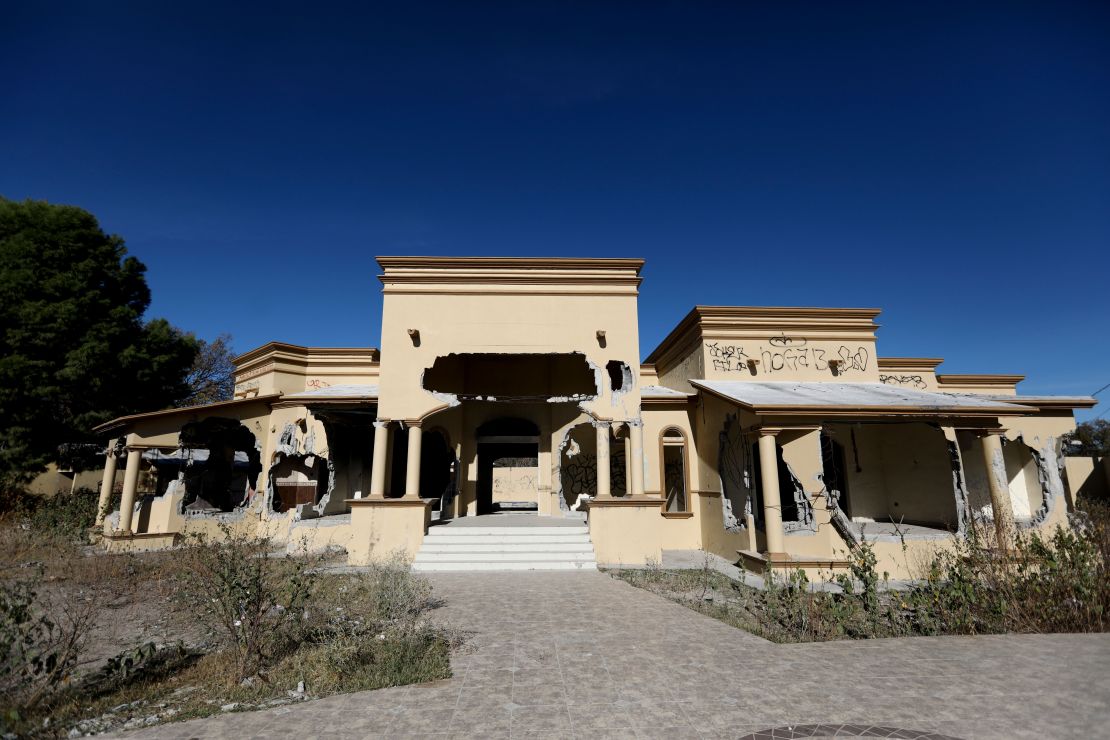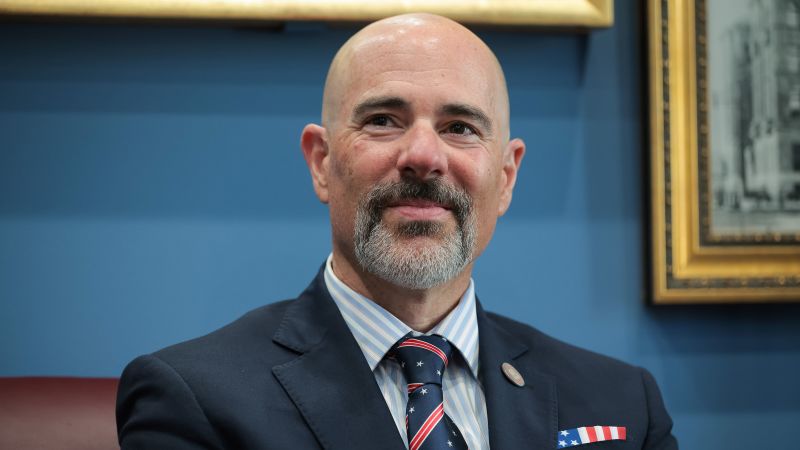CNN
—
Years ago, the Drug Enforcement Agency was shaken by a pair of particularly deadly overseas incidents: a botched operation by a US-vetted Colombian police squad that left 10 local officers dead, and a cartel’s brutal retaliation in a small Mexican town that killed dozens.
In both Colombia and Mexico, according to CNN interviews with more than a dozen former DEA officials, key figures in those cases worked with an agent named Terrance Cole – who now is President Donald Trump’s nominee to run the agency.
The exact nature of Cole’s role in those incidents has never been made public, in part because the DEA has declined to release two internal reports that former officials told CNN were produced in the wake of the bloodshed in Colombia and Mexico.
Now, former DEA officials have sent an unsigned letter to lawmakers asking them to publicly question Cole about his actions in those cases and more broadly raising concerns about his record at the agency. Roughly a dozen former DEA officers contributed, the lead author said, about half of whom spoke with CNN. Most of the critics who spoke with CNN spent decades in the DEA and reached executive-level positions; several worked directly with Cole, though none had firsthand knowledge of his actions in Colombia or Mexico.
The office of Sen. Dick Durbin, the ranking Democrat on the Senate Judiciary Committee that will hold Cole’s confirmation hearing on Wednesday, has been speaking with some of those critics, his staff said.
“I can confirm that Sen. Durbin’s staff has been in contact with multiple concerned parties about Terry Cole’s nomination,” said a spokesman for Durbin, Josh Sorbe. “As with all nominees, the Senator will continue to scrutinize Cole’s record and looks forward to the opportunity to further examine his record at his hearing.”
Three former DEA agents who support Cole, however, told CNN that neither internal report found fault with Cole, and that he bore no blame for violent deaths in countries on the front lines of the drug wars. Those agents declined to share the internal reports with CNN to verify those findings. The Cole critics who spoke to CNN had not reviewed those reports.
Cole, 55, who left the agency in late 2019 for the private sector and now serves as Virginia Republican Gov. Glenn Youngkin’s secretary of Public Safety and Homeland Security, did not respond to requests for comment. A DEA spokesperson also declined to comment, referring queries to the White House. The DEA has previously defended its actions in the lead-up to the Mexican incident, blaming the violence solely on cartel leaders.
Trump has touted Cole’s work in Virginia overseeing 11 state public safety agencies with more than 19,000 employees.
“Terry Cole is the perfect choice to deliver on President Trump’s mandate to end drug distribution in the United States,” said Harrison Fields, a White House spokesman. “His nomination of Terry Cole proves his unwavering commitment to making our country safe again and anybody who says otherwise isn’t prioritizing the well-being of Americans.”
The letter to lawmakers about Cole – who spent 22 years with the DEA – is the latest challenge in a bumpy White House effort to fill a key job in its campaign to rein in Mexico’s powerful drug cartels. Trump’s first nominee to lead the DEA, Chad Chronister, a sheriff in Florida’s Tampa Bay region, quickly withdrew from consideration.
The first of the deadly overseas incidents noted in the letter came in 2006 in Bogota, where Cole was stationed as a special agent, according to his online resume. An elite group of 10 anti-narcotic Colombian police officers, who were polygraphed by the DEA as part of its vetting process and worked directly with Cole, according to agents who served with him, were gunned down by a platoon of Colombian soldiers later convicted of working for drug traffickers.
Five years later, Cole was working in the DEA’s field office in Dallas, supervising a probe into the leadership of the powerful Zetas drug cartel in Mexico, according to agents who worked with Cole at the time and press reports. In early 2011, the Zetas carried out a mass murder that was later the subject of a yearlong investigation published jointly by ProPublica and National Geographic. That report found that the border region violence was sparked when DEA officials shared intelligence produced by an agent Cole supervised with Mexican federal police, who then leaked it to the cartels.
Cole’s defenders told CNN that he was not at fault in the Mexico or the Colombia case.
“He’s worked in two of the toughest places in the world when it comes to drug-trafficking investigations – in Colombia and Mexico – where bad things happen every day,” said Matt Donahue, who worked as Cole’s supervisor for several years in Colombia, but who’d taken another job in New York when the police officers were killed.
The detractors, though, say Congress has a responsibility to demand a more public accounting of his record.
“There’s bad luck, but how many times do you have lightning strike twice?” a former DEA agent said.

Cole was in his early 30s when he came to work as a special agent in the Bogota office in 2002 after a nearly five-year stint in Oklahoma, according to his online resume.
Colombia was no Oklahoma. The country was steeped in drug-related violence as well as a long-running civil war. Its former president, Andrés Pastrana, sought US help in neutralizing its all-powerful cartels. As the US poured billions into Colombia’s war, DEA agents vetted and trained Colombian police, who often did the dirty work of apprehending traffickers and seizing drugs.
Donahue, Cole’s former boss in Colombia, said Cole was not directly in charge of the anti-narcotics unit that ended up in the middle of the deadly raid. Rather, he said, Cole worked alongside the squadron as a colleague with a handful of other agents. He frequently flew from Bogota to the unit’s headquarters in Cali, where they listened to wiretaps and exchanged information. Cole and the other DEA agents also helped train the officers and coordinated classes on how to conduct investigations and handle informants, Donahue said.
On May 22, 2006, 10 members of that unit headed for a psychiatric facility in Jamundi after an informant told them a 220-pound stash of cocaine was nearby. Wearing green police vests and ballcaps, the officers arrived with the 37-year-old civilian informant – and were greeted with a hail of bullets, according to a detailed report published in Semana, a weekly magazine in Colombia.
Twenty minutes after the attack began, all 10 officers – plus the informant – were dead. Most were shot at close range; some were killed by grenades.
The attack was carried out by a platoon of military soldiers. Fourteen of them and a colonel were later convicted of aggravated homicide – prosecutors said they’d acted on orders from drug traffickers, according to media reports.
US coverage of the debacle was sparse and often didn’t mention the role of the DEA. But a Semana story published days after the massacre said Cole was among the first officials to arrive at the crime scene that evening. DEA agents flew to Cali after the killings on a Colombian military flight with local officials, said a White House official speaking on the condition of anonymity.
“In an unusual event, this man wept in public,” the Semana article said. “After a few minutes, he managed to say: ‘This has to be explained. Nothing must be hidden from us or from Colombia.’”
In the letter to US senators, the former DEA agents allege that Cole failed to properly oversee the unit before the killings and that he personally missed the deadly raid because he was “distracted.”
Cole’s defenders strongly reject this contention.
“It’s easy to sit back and say that now 20 years later,” Donahue said. He added, “I don’t think (the letter) has any credibility because it’s anonymous.”
The White House said Cole had no direct role in the failed operation.
“(The) DEA had nothing to do the operation that resulted in the massacre,” said the White House official, adding that the agency had “no knowledge of the police operation. This was a Colombia national police operation.”
A Colombian military report on the massacre did not mention the DEA, the White House official said.
A former DEA agent who said he worked on and reviewed the agency’s own internal report on the incident said it found no fault with Cole. That agent told CNN he no longer has access to the report. He added that because the police unit was embarking on a routine seizure operation, it wasn’t unusual for Cole not to ride along.
“It wasn’t a capture operation, which would be something like, yeah, you’d definitely cancel your vacation plans if you had good intel to go capture one of the top guys,” the former agent, who spoke on the condition of anonymity to discuss a confidential report, told CNN.
David Gaddis, the DEA’s regional director in Colombia at the time, said Cole had no fault in the operation. The DEA only provided support to the vetted units, and it wasn’t the DEA’s decision to carry out an operation.
“The DEA only provides the intelligence, and it’s up to the Colombians to decide when an operation is doable,” Gaddis said.
Another former official who worked in Colombia years after the 2006 attack also said it wasn’t out of the ordinary for a Latin American police unit’s DEA liaison to be absent on the day of such a raid. “They’re policemen – they have their own sovereignty, their own responsibilities, and they have their own chain of command for reporting,” that agent told CNN.
The deaths deeply impacted Cole, his colleagues said. Another former DEA official who worked with Cole in Texas said Cole kept a memorial of the slain unit in his Dallas office.
“That can’t be something that he’s responsible for,” the former official said. “I’m friends to this day with people I worked with 35 years ago in these countries. … It would’ve hit him hard, just like it hit me hard when guys I worked with were killed.”
Cole left Colombia for a brief stint in Afghanistan before taking a job in 2007 in the Dallas office as a group supervisor who later oversaw a probe into Mexican drug cartels.
About four years later, the Dallas office received a promising lead out of Mexico with big implications, according to the ProPublica story. The broad details about the case described in the article were confirmed to CNN by Dan Salter, Cole’s former supervisor from the Dallas office, and a former DEA official who said he reviewed an internal report on the case.
An agent named Richard Martinez, whom Salter confirmed was a direct report of Cole’s, had gotten a breakthrough tip from a source about the violent Zetas cartel: trackable IDs for BlackBerry phones belonging to two alleged leaders of the cartel, Omar and Miguel Treviño. Martinez, who was named agent of the year in 2011, passed the cell phone IDs to his superiors in Dallas.
Salter said that in general, when Martinez had intelligence, Cole coordinated with him and other superior officers before anything was passed on to the DEA’s Mexico City office and then to foreign counterparts. “It wouldn’t have gone without my concurrence,” Salter said.
Salter ultimately decided to share that information with the DEA’s office in Mexico City, according to the White House official, who said he “followed standard protocol.”

Both Donahue and the White House official said it was Mexico City’s DEA unit – not Cole’s in Dallas – that signed off on passing the tip to the Mexican federal police.
Soon after the tip was shared with the Mexican officials, all hell broke loose: The kingpins unleashed a torrent of violence on the town of Allende – possibly in a frenzied hunt for those helping the DEA. Operatives with the Zetas arrived in 50 trucks and, in a rampage that lasted weeks and spread to other towns, ProPublica reported, terrorized the region. When it was over, authorities estimated at least 28 people were presumed dead or missing. Some estimates put the toll as high as 300.
Ernest Gonzalez, the assistant US attorney who worked on the case, told ProPublica he was upset that DEA management decided to pass the numbers to Mexico. “It was a great opportunity,” he told the publication. “But it was squandered because it wasn’t done correctly.”
Now a federal judge in Texas, Gonzalez did not return multiple emails and calls to his office from CNN. Martinez died in 2019.
Cole’s critics say his precise role in handling Martinez’s intelligence should be made public and question whether he should have fought to keep it from Mexican authorities.
But Salter told CNN that Cole did nothing wrong. “Terry did not act unilaterally,” he said.
Salter added that the decision to forward the intel would have been routine and that the DEA had never had issues before sharing information with their Mexican colleagues.
“We did it almost every day,” Salter said. “Never had we had an issue until this horrible event.”
Salter said that while he doesn’t remember any objections from Martinez and Gonzalez to passing the intel in this specific case, there were times when opinions on such matters differed.
“What you typically have in an investigation is you have case agents and prosecutors sometimes that are – they like to hold information tight because they think of the worst possible thing,” he said.
But one former high-ranking DEA official who spoke to CNN said that in his view, it was far from routine to share such particularly sensitive intelligence with Mexican officials.
“Nobody ever wants to get other people killed,” said the official, who spoke on the condition of anonymity because he said he still works with the government and fears retribution from Cole. “Now does it happen sometimes? Yeah, but if you’re reckless about it, it’ll happen more often.”
The DEA produced a 32-page internal report on the Allende killings – though not until after political pressure mounted following the ProPublica report, said a former DEA official who has a copy of the report. The official said the report concluded that while the leak occurred, it wasn’t the reason for the mayhem. Rather, he said, the agency concluded the Zetas were incensed about recent drug and money seizures.
“They kept seeing all these seizures in the Dallas area, in Chicago – all this money but no one was going to jail,” said the official, who declined to provide the report to CNN and asked to remain anonymous due to the report’s sensitivity. “So, they started suspecting people.”
Donahue, meanwhile, said if he had been in Cole and Salter’s position, he too would have passed the tip on to the DEA’s Mexico City office, which he said is “standard operating procedure.”
“You gotta weigh your risks and all that,” he said. “But if you’re going to go after people like (the Zetas leaders) … you gotta pass intelligence.”
In past interviews, DEA officials have stressed that, the Treviño brothers, the alleged Zetas cartel leaders behind the killings, were eventually apprehended. They were among 29 Mexican cartel operatives extradited to the United States in March.
Cole is not able to comment on the Allende incident because of the ongoing criminal case involving the Treviños, the White House officials said.
“The DEA’s official position is: That’s squarely on Omar and Miguel Treviño,” Russ Baer, a DEA spokesman, told ProPublica in 2017. “They were killing people before that happened, and they killed people after the numbers were passed.”
With a day to go before Cole’s confirmation hearing, it’s unclear whether he will face resistance from the GOP-controlled Senate.
The critics who sent the unsigned letter to lawmakers say their concerns go beyond Cole’s role in the two overseas cases. They note that in two decades at the DEA, he did not rise past the level of upper-middle management, although he now occupies a Cabinet position under Virginia Gov. Youngkin.
“And now we’re skipping over all the way to letting him run the organization,” said a former high-ranking DEA official. “He doesn’t have the leadership abilities.”
But more broadly, those critics say lawmakers owe the public a chance to learn more about what Cole did before the Mexico and Colombia incidents.
“Cole has demonstrated, at a minimum, two clear operational failures (Colombia and Mexico) resulting in two of the most consequential failures of DEA and resulting in the murder of law enforcement partners and civilians,” the letter to lawmakers states. “Cole has clearly shown an INABILITY to run complicated enforcement operations.”
The former high-ranking DEA official said he fears what Cole’s confirmation to become the next administrator would mean for the agency.
“The administrator sometimes has to push back against the administration for what’s good for the agency, and you are not going to see that,” he said. “You’re going to see a lot of people retire.”
Donahue and Salter strenuously disagree that he is unfit to lead the agency, which is headed on an interim basis by veteran DEA official Derek Maltz.
“(Cole) had some of the biggest seizures of all time in Colombia,” Donahue said, noting that Cole’s busts also led to crucial extraditions of suspects to the United States. “He was really engaged.”
CNN’s Evan Perez contributed to this report.

